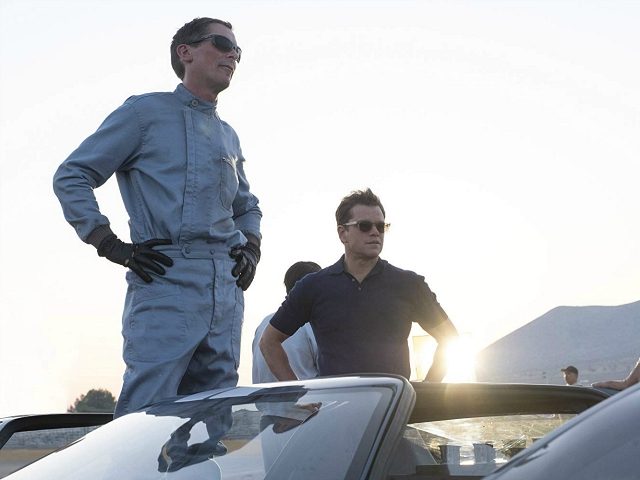After stepping out of my Charlie’s Angels (2019) screening, where I was the only person in the theater, one of the ushers asked me how I liked it. “Dreadful,” I replied, while purchasing my Ford v Ferrari admission. “Hopefully this one features men acting like men as they burn fossil fuels, throw punches, and stick it to the French.”
FVF is even better than I had hoped, better than its mostly glowing reviews. So much better.
The racing scenes are fantastic and feature almost no CGI. Matt Damon and Christian Bale are as appealing as they have been. And while the French do get it stuck to (as does Ferrari), there’s also an entertaining and important streak of anti-corporatism that drives the movie’s theme and plot. This is not so much Ford v Ferrari as much as it’s Two Individualists v Ford’s Corporate Suits.
Based on a true underdog story, it’s the mid-sixties, and Damon plays Carroll Shelby, the legendary American racer and car designer dry-docked by an injury and up against it financially as he tries to sell his cars (sometimes more than once). And then in walks Lee Iacocca (Jon Bernthal) with an insane idea attached to a pile of money. Shelby has 90 days to design and build a Ford racecar that will win Le Mans, France’s brutal 24 hour endurance race.
This is about corporate pride and money. Ford wants to humiliate Ferrari (I won’t spoil the why) and refurbish its image for the Baby Boomer generation, a group of teens who enjoy something no previous generation has ever before: money to spend.
Shelby grabs the opportunity, but knows a car is not enough. Behind the wheel, you need the best. Unfortunately the best is Ken Miles (Bale), an eccentric and temperamental Englishman who has a thing about authority. The suits are fine when Miles is working behind the scenes, but they refuse to have him as the face of the brand. So it’s left to poor Shelby to navigate a corporate nightmare filled with egos, countless middle managers, and the fact that race design and driving is an art, and with that art comes the artistic temperament often associated with genius — meaning the wrench-hurling Miles.
Director James Mangold has delivered 152 minutes you never want to end. His screenwriters, Jason Keller and brothers Jez and John-Henry Butterworth, crafted one scene after another that qualify as brilliant and brilliantly entertaining short films. FVF is beautifully structured. The story flows effortlessly. The dialogue is sharp and oftentimes hilarious (“They said I’d have carte blanche this time. I looked it up, it’s French for ‘bullshit.’”) The relationships between the characters are all believable. The cinematography is gorgeous. The production design is so flawless you forget it’s 1965. The characters are well defined. And the acting… Wow.
Bale is simply superb as an eccentric artist brimming with confidence, desperate to do what he was born to do, but only on his terms. He’s also a devoted family man with a bottomless love for his wife and son.
Damon is his equal, a proud and ambitious Texas man dealing with his own disappointments as he navigates Los Angeles and the buttoned-up corporate world of Ford in his cowboy boots and hat.
As Henry Ford II (they call him “The Deuce”), Tracy Letts might be Oscar-bound with a flawless portrayal of an endlessly complicated man you end up liking and hating. It’s a knockout performance and his crying scene practically had me on the floor laughing.
There are two genres at work here, neither of which we see enough of. We have both a racing movie and a movie that celebrates that unique, can-do American spirit only made possible through a perfect blend of rugged individualism and team work.
This is also the rare, big-budget Hollywood movie that focuses on the importance of fathers, that depicts two masculine men who are stoic rather than confessional, who prefer to communicate with a punch over a rap session, who drive fast and burn fossil fuels… Who do all this without apology, without a bossy harridan demeaning them about their “toy cars” and how it relates to penis size.
There is nothing pretentious about FVF, no buzzkills, no woke, no lectures, no puffed up sense of self-importance. Which doesn’t mean Mangold doesn’t have a message. Of course he does, and it’s a vital message told through character and theme about being your own man, about not getting chewed up in the corporate collective, about sons and fathers and husbands and wives and friends and chasing the impossible…
This is a message that reminds us about what it means to be a true American.
Follow John Nolte on Twitter @NolteNC. Follow his Facebook Page here.

COMMENTS
Please let us know if you're having issues with commenting.